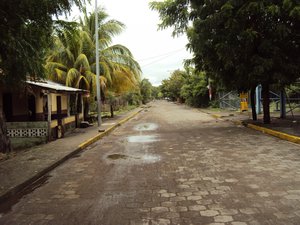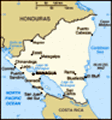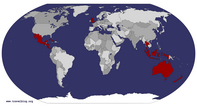Advertisement
Published: June 15th 2010

 San Francisco Libre
San Francisco Libre
Next stop google street view!We were excited to visit San Francisco Libre, the Nicaraguan town that is twinned with Reading. It certainly had an air of mystery to it as it is not mentioned in any guide books that we've seen (it is not yet a tourist destination by any means), and internet searches reveal little other than the twinning links and statistical information. Due to the twinning links we were able to really scratch the surface of this Nicaraguan town in a way that would be near impossible in any of the tourist towns, such as Granada, without a lengthy stay.
We arrived mid to late afternoon after a few bus rides, including a short wait in the dingy highway town of San Benito and an hour or so of the San Francisco Libre chicken bus picking it's way carefully along the dirt road. We were treated to a compilation of 80's soft rock powerballads played at full volume on the bus. We had been warned that the road wasn't in great shape and that progress would be slow, and it really was. Furthermore we crossed bridges where the water level of the river flowing beneath was an inch from the top! We
assumed that SFL had experienced the same rains as Leon, however if we had been keeping an eye on the local news we would have known the full story.
The rains we sat through in Leon were part of the outer less intense area of Tropical Storm Agatha that caused massive devastation in Central America, particularly in Guatemala (where a volcano had recently erupted causing a lot of problems, and a large sinkhole had appeared in the capital swallowing up what had been there previously!). Considering what happened elsewhere, the rains we suffered were pretty paltry and we were very lucky! The storm now has it's own Wikipedia page, put together pretty quick! You can read all about it (if you want to, or you can just look at the satellite pictures of the storm!)
here. In fact, the activities in and around the town had earned a front page full photo spread in a national newspaper, and the town is even referenced in a
'Latin American Herald Tribune' article now - something else for Google to pick up on!
When we arrived in the town and met Jenny and the other German volunteers (who are visiting the town for a

 View over the town
View over the town
In the distance is Lake Managua and Momotombo Volcanoyear) at the local library, the full extent of the storm became apparent. We were actually on the first bus into the town since the storm, and the military had just finished building a bridge to replace one that had been washed away. The floodwaters had receded enough for the bus to drive on the road (and wade through the shallower-still flooded parts!). Furthermore, the military were in town with their helicoptors and boats (San Francisco Libre sits on Lake Managua/Xolotlán, across from Managua, the capital), rescuing people from the nearby villages that were now cut off due to the rain having burst riverbanks and washed away other bridges! School was out for the time being, as it was now the temporary home of the rescued villagers. Furthermore, the whole town was without electricity, save for those with generators and those on the periphery that were connected to a different source. I'm not sure if it was because of this, or because of another reason, there was also no running water.
So after meeting the German volunteers that worked at the library (a trip to Managua was planned to buy books for the next day - an area where
funds are always appreciated, as books in Nicaragua are rare and expensive), who also operate after school clubs for children that include music lessons, arts and crafts and homework help (when we arrived they were helping some kids make mother's day cards), being shown around the library and being introduced to the kids, Jenny took us over to the town's one hospedaje. It was run by a nice lady who had lived in the USA, but I think it may not have seen occupants for a very long time. A room was opened up for us, then quickly cleaned and bed-sheets changed. It was a large room, and the cheapest we have found so far. It had a big hole in the window screening which Sarah very resourcefully plugged with her t-shirt, saving us from the mosquitoes! We were encouraged to buy candles due to the power situation, and they came in very handy as the power hadn't returned by the time we had left, two days later. Sarah saw a scorpion scurry across our floor one morning, so needless to say we stepped very carefully around the dark candle-lit room!
We then had a wander around the town

 Red & Black Trees
Red & Black Trees
Political colours for the Sandanistaswith Jenny, having a good look around. The town is quite modest, though it does boast a rather grand Catholic church. At one end sits the Carlos Fonseca (a Zapatista Civil War hero) port, a shiny pink recreation area, that much to the annoyance of the townspeople closes at dusk to save on it's electricity costs. Here we sat and looked out at the lake. We could see Volcano Momotombo as well as a volcanic island called Momotombito. At night you can also see the lights of Managua.
As it was getting dark we were advised to visit one of the two comedors for our dinner (we were advised against the one that had included a hair and a match in Jenny's food the time that she visited), however due to the power situation they were both closed for business. So we went to the little pulperias (like corner shops), each as dark as a cave, peering around with the help of the shop-owners' torch beams, finding some sugared pastry things, bananas, ritz crackers and chocolate money for our dinner. We took our find back to our room, lit a candle, and enjoyed our picnic while playing cards (playing

 Catholic Church
Catholic Church
The grandest building in town!them close enough to the candle so that we could see, but being careful not to burn them) and sipping on some rum that we had with us.
The next day it had been arranged for us to walk up the hill (to a part of town that had power!) to meet the people behind Mujeres y Communidad, a local organisation that does many fantastic things for the community. We met Jenny's host mum, who works at the centre, and walked with her the 20 minutes or so up the hill. There we met an American girl, Colleen, who was working there as an intern as part of her studies in Boston. She had been in town for three months, working at the centre and living with a local couple. She was really great, taking lots of time to talk with us about the town and about the centre. She even arranged for each of the ladies there that day to talk to us about what they did in particular (translating the bits we didn't understand) and answering our questions (also translated!). I think she was also happy to switch back to speaking English for a while! Each lady
there has a particular area of expertise. These range from helping victims of abuse, to sexual health and education, legal aid, and (and this is what impressed us most) arranging regular workshops in each of the nearby communities to tackle the problems of machismo (or machista as it is called here) which is regarded as a problem in pretty much all of Latin America it seems. In case you are not familiar with the concept, the term machismo is used to describe a man who will not let anything "detract from his manly image". This can include aggression towards other men and women, dominance over women and general arrogance towards women, (as soon as Sarah is on her own for a second she gets an unwelcome taste of it here!), Mujeres y Communidad work with young boys who have a good standing in their communities, who then in turn give presentations, fanning out the ideas in that manner. We were told that sometimes this can lead to alienation from some, but that on the whole the outcome has been really positive. The women were all really happy to take time out of their day and tell their tales, and we

 Entrance to the port
Entrance to the port
With a slightly optimistic two lane traffic system!were very grateful to them.
The German volunteers eat at the house of a local family, which provides an income for them, and decent healthy meals for the volunteers. We were ecstatic to join them for lunch and eat a hearty meal of rice, beans, plantains and tortillas with a lovely cinnamon/cacao drink. It was cooked by and shared with a friendly girl called Rebecca who also works at Mujeres y Communidad, and who travels to Managua every Saturday to study at university (Saturday students are called 'Sabaditas' here).
That afternoon we met up with Colleen again and had another wander around the town, with an extended sit at the very scenic Carlos Fonseca port. Here we saw a fair few boats come in with military men and local villagers. On our walk around town we stopped for a huge portion of "tajadas" (thin fried plantain strips served with shredded pickled cabbage and a huge slab of fried salty cheese). We were also shown around the gynaecologysurgery and the small pharmacy, where locally made all-natural products are sold. We also met Colleen's host Dad, a friendly chap who worked as a security guard for one of the few
private business buildings in the town.
As it started to get dark we said our good-byes and thankyous and went to see what we could find in the way of dinner. It turned out to be an exact repeat of the night before - no power so no food being served, so snacks from the local shops being eaten in our dark room while playing cards and sipping rum! However we did supplement this with a mango from the family next door who had a big basket of mangos to sell. They charged us 1 cordoba for a mango. That is roughly 3.2 pence. We have got very used to a constant supply of cheap mangoes (our favourites are the bags of already chopped up mango that ladies sell on buses or street corners for 5 cordoba - taking all of the hassle out of it for us!) and will find it a shock i'm sure when we return home.
One thing of note that we loved about SFL is that when people pass each other in the street, instead of saying 'hola' (hello) they say 'adios' (goodbye). It being a small town with very few visitors, we

 Locals watching the military
Locals watching the military
Unloading rescued villagers at the portwere soon the talk of the town, (Colleen's host Mum had already heard about us before she even told her!), and so we got to join in with the friendly 'adios's' being bounced around, but we just could not get used to saying goodbye to people as a form of greeting!
The next morning, with the power and water supply still not apparent, and after a good day of meeting and chatting with people and seeing the town, we decided to head on out and visit some highland towns north east of SFL, catching an early morning bus out. We left having had the privilege to see a town that few if any other tourists see, that while not being pretty architecturally like, say, Granada, is a fascinating place as it exists very independently due to it's relative isolation (one road in and out), has a stunning location at the edge of the great lake, sits across from the capital as well as picture perfect volcanoes, and furthermore we got to see the inner workings of small parts of the day to day life of people here. We also experienced real warmth and openness from the people we met
and spoke with. It was a shorter visit than we had anticipated, but a very worthwhile and fascinating visit.
Advertisement
Tot: 0.114s; Tpl: 0.012s; cc: 11; qc: 55; dbt: 0.0662s; 1; m:domysql w:travelblog (10.17.0.13); sld: 1;
; mem: 1.2mb










